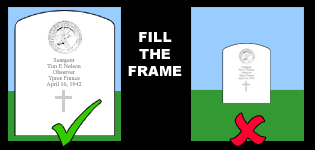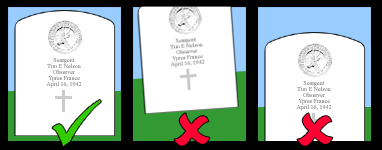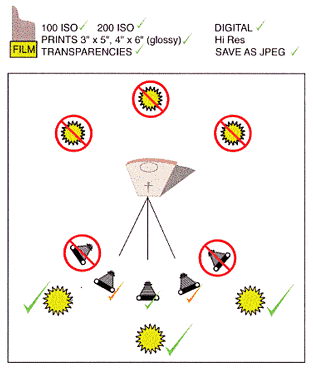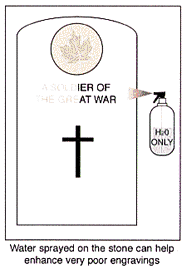| |
Photo Guide
- Taking the photographs on a cloudy or overcast day is better
than bright sunshine -- usually.
- Spraying water -- and water only -- on the inscription may
help to define it and make it easier to read. Do this ONLY if the inscription
is very difficult to read.
- Do not damage any flowers planted in front of the headstone
epitaph. If it is possible to move flowers or foliage away from the
front of the headstone without doing damage to them, then do so if needed.
If the epitaph cannot be seen because of a plant that's okay because
you will be recording that inscription anyway, but if you can move the
foliage out of the way that would be best.
- Be sure to crouch down to the level of the headstone and move
in close to fill the viewfinder frame with the image of the headstone
being sure to get the whole headstone. We are not interested in anything
else but the headstone.


- When you have taken all the headstone shots in a particular cemetery,
please also take one shot of the cemetery showing the setting
of the graves. We do not need shots of the Cross of Sacrifice or Stone
of Remembrance on their own (they are all the same) but they could be
included in the general view if it also includes the war graves.
- In a war cemetery or war grave plot within a larger cemetery, there
may be planted greenery or flowers in front of the epitaph. It
should be possible to gently move this aside while photographing the
epitaph. Please photograph the epitaph separately if it cannot be seen
in the photo of the whole stone. Please take care not to damage the
plant. If this is not possible, then please take note of the inscription.
Digital Photo Hints
- The order of taking photos is VERY IMPORTANT.
- Take a photo of the cemetery in which the graves to be photographed
are located. If possible, include a sign with the name of the cemetery
in the first picture of those from that cemetery.
- Take the first grave photo as per the above instructions.
- Then take the epitaph at the bottom if there is one and it cannot
be seen in the main photo. That way, when we are processing the
images we will know that that image of the epitaph belongs to the
previous grave photo.
- If any part of the inscription is faded or at all difficult to
read,
take an extreme close up of the suspect area. This is particularly
important with the identification number at the top of the inscription.
Sometimes it is difficult to distinguish between an 8 and a 3, or
a 3 and a 5 or a 6 and a 0, depending on the style of the font and
the extent of the deterioration of the engraving.
- Move on to the next stone and repeat the process.
- Shoot at the medium resolution. (minimum 1200 x 800, preferably 1600
x 1200) We do not need high resolution (large sized) files.
- Once you have finished the photography, store the photos in a JPEG
format on CD and mail to us, or email them to: ralph@southafricawargraves.org
- Do not manipulate the photos in any way.
- If you choose to name the photos, please use this naming convention
"Cemetery Name_LastName_FirstInitials"
- Please be sure to label each disc with the contents. Include the
name of the cemetery, the location and your name. Please create an index
of names contained on each disc.
Photo Guide reprinted with kind permission
of Steve Douglas and the Maple
Leaf Legacy Project
|
|



